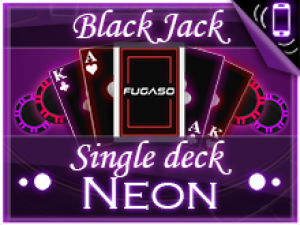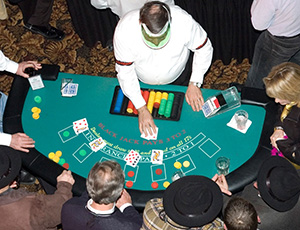How To Beat Single Deck Blackjack
- How To Beat Single Deck Blackjack How To Play
- How To Beat Double Deck Blackjack
- How To Beat Single Deck Blackjack Machine
Single deck blackjack has often been looked at as the holy grail of the game because it offers players the best chance to win profits. In fact, the house edge is just 0.15% when players stick to blackjack games with a single deck. With this being the case, you’d think that single deck blackjack is the greatest thing ever. However, there are actually some disadvantages to the subject as well, which is covered below along with single deck blackjack advantages.
Learn how to read a blackjack strategy chart and find examples of a 6 deck black jack strategy charts to use while playing online blackjack games. In single- or double-deck games dealt facedown, pick up the cards with one hand, scratch the table with the cards for a hit, and slide the cards under your chips to stand. Turn the cards faceup if you bust or if you wish to split pairs or double down. At the conclusion of play, let the dealer turn faceup any cards under your chips.

Advantages
The obvious advantage to playing single deck blackjack is just as we stated before in that you’re getting the absolute lowest house edge. Facing a 0.15% house edge puts you on nearly a level playing field with the casino, and makes your chance of profiting seem like a coin flip. Of course, to take advantage of the low casino edge, make sure that you understand good basic blackjack strategy first – otherwise, it doesn’t really matter how many decks you’re dealing with.
One more big advantage of single deck blackjack comes for card counters. Usually, card counters these days are dealing with six and eight deck shoes, which means they have to wait longer for favorable counts. But with single deck blackjack, card counters don’t have to wait nearly as long to get a favorable count, thus letting them bet big much sooner.
Disadvantages
Based on the aforementioned advantages, you wouldn’t think there’d be much downside to single deck blackjack. But the problem is that casinos often advertise single deck games, yet offer unfavorable rules to increase the house edge. And what’s bad about this is that the house edge can actually end up being higher than with six or eight deck blackjack.
In the worst case scenario, casinos will only make 6:5 blackjack payouts instead of 3:2 payouts. This one rule alone will bring the house edge from 0.15% all the way up to 1.45%. Considering the fact that you can still keep the house edge at around 0.5% with both six and eight deck blackjack, it’s sometimes not even worth the effort to search for single deck games. Casinos might put other unfavorable rules in the single deck games too, so watch out for this.
Another disadvantage to single deck blackjack is that you’re very unlikely to earn many comps with this version of the game. After all, if it’s true single deck blackjack you’re playing, the casino won’t make much money off you in the long-term. That said, they aren’t going to be generous with comps either.
If you’ve spent any time at blackjack tables, you’re probably familiar with the pay structure for a “natural,” also known as a blackjack. If you’re dealt an Ace plus a 10 point card like a face card or a ten, you have a “natural.” Traditionally, a natural pays out at 3-2 odds, meaning if you bet $10, you’d win $15 instead of the usual $10.
Beware of a slight change in the rules of blackjack offered by lots of casinos in Vegas and elsewhere in the world–look for a little card or sign that says “Blackjack Pays 6-5.” This means that instead of winning $15 for your natural, you’d have won just $12.
Believe it or not, this slight change in the rules of blackjack greatly affects the player’s odds. This rule is most often a part of a single-deck blackjack game. Since lots of blackjack players automatically assume that single-deck blackjack offers better odds, they’ll step up and play a 6-5 game without realizing the impact that rule has on their odds.
How the 6:5 Rule Affects Blackjack Odds
Let’s just write it down in black and white–a casino that pays 6-5 for a natural increases its edge by 1.39%. That means that players who use basic blackjack strategy are now at a 1.45% disadvantage instead of the standard 0.56% for an 8-deck game of blackjack. That means that the 6-5 payout rule triples the casino’s expected take, a huge difference in the odds for a single rule change.
If you bet $25 per hand, playing a standard average of 80 hands per hour, you can expect to lose $11.20 per hour of play. If you were to switch over to the single deck game (with a 6-5 blackjack payout rule), you can expect to lose $29.00 during that same hour. Considering that a blackjack game with an 8-deck shoe is supposed to be the worst possible table to play at, you’d think a switch over to a single deck game would be a smart financial decision. Not so, if they pay out 6-5 for a natural.
It is easy to forget how much a single change of the rules of blackjack affects your potential winnings. Blackjack tables where the dealer stands on a soft 17 lose about 0.21% of their edge. If a blackjack table doesn’t allow doubling after splitting, the player edge is reduced by about 0.11%. These sound like small numbers, but spread over 80 hands an hour, they can have a big impact on your bankroll. The 6:5 blackjack payout is no different.
How to Overcome 6-5 Blackjack
In the casino, you vote with your chips. The best way to get around the 6-5 payout rule is to not play any table offering 6-5 for a natural. If enough people avoided blackjack games with this rule, the casino would have to stop offering them.
Another way to beat the house when they only pay out 6-5 for a blackjack is to learn to count cards. If you step up to a single deck game (most of which payout 6-5) and you’re armed with the ability to count cards, you can still take money out of the casino’s coffers with regularity. At a single deck game, the dealer is trained to recognize card counters, so you’ll probably be asked to leave as soon as you start winning, but before you’re booted out, you can make a nice withdrawal.
The next time you’re in the casino, make sure you only play tables that pay out at least 3-2 (sometimes called 1.5-1) for naturals. If people continue to do business with casinos that only pay 6-5, they’ll keep opening new 6-5 tables.
Related News
How To Beat Single Deck Blackjack How To Play
How To Beat Double Deck Blackjack
Next Article: Card Counting Myths Debunked


How To Beat Single Deck Blackjack Machine
Previous article: How Not to Play Blackjack